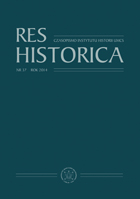Ławryn Drewiński – najważniejszy prawosławny protagonista szlachecki w czasach Zygmunta III
Ławryn Drewiński – the Most Important Orthodox Noble Protagonist in the Reign of Sigismund III
Author(s): Tomasz KempaSubject(s): Cultural history, Political history, Social history, Eastern Orthodoxy, Sociology of Religion
Published by: Wydawnictwo Naukowe Uniwersytetu Marii Curie-Sklodowskiej
Keywords: Sigismund III Vasa; Ławryn Drewiński; Ruthenian nobility; Orthodoxy; the Union of Brest; the Diet (Sejm) of the Polish-Lithuanian Commonwealth; the orthodox Brotherhoods;
Summary/Abstract: The article concerns one of the most important Orthodox noble leaders in the times of the Polish-Lithuanian Commonwealth – Ławryn Drewiński. He was one of the most outstanding parliamentarians of the Old Polish era. He participated in 15 parliamentary assemblies. He became famous for his expressive speeches in the parliamentary forum (especially in 1620 and 1621) in defense of the Orthodox Church, which after the conclusion of the Union of Brest (1596) had to compete with the Uniate Church for the preservation of previously held freedoms and privileges. Drewiński was a deputy from the Volyn voivodeship, whose sejmik, during the reign of Sigismund III Vasa, most often spoke about religious matt ers, consistently advocating for religious tolerance. He played an outstanding role during the interregnum of 1632, when the Orthodox managed (largely thanks to the determination of the king-elect Władysław IV Vasa) to regain some of the bishoprics, and then also a number of churches, previously taken over by the Uniates. Despite his consistent stance of fi delity to Orthodoxy, in 1629 he actively supported the att empt to build a union between the Orthodox Church and Uniates in the Polish-Lithuanian Commonwealth. Drewiński was also one of the most active activists of the Orthodox brotherhoods in the times of Sigismund III, seeing them as an opportunity for the spiritual and intellectual revival of Orthodoxy in the Polish-Lithuanian Commonwealth. Despite the emphasized Ruthenian origin, Drewiński was also to some extent polonized. In public activities, he used the Polish language. Like his father Basil, he was a supporter of the Polish-Lithuanian Union, while at the same time being an opponent of involving Moscow in the fi ght for the restoration of the Orthodox Church in the Polish-Lithuanian Commonwealth (after the Union of Brest).
Journal: Res Historica
- Issue Year: 2023
- Issue No: 56
- Page Range: 89-150
- Page Count: 62
- Language: Polish

